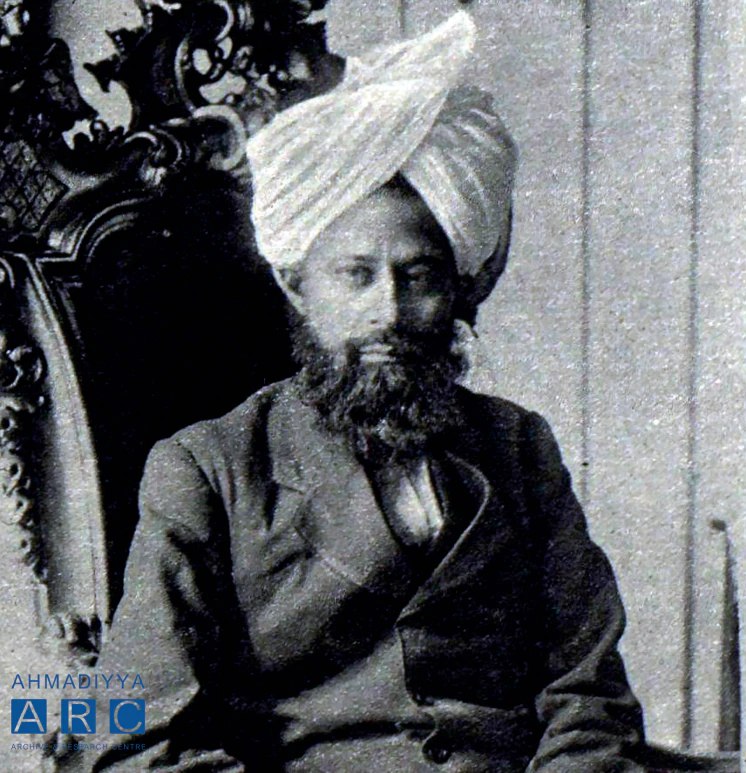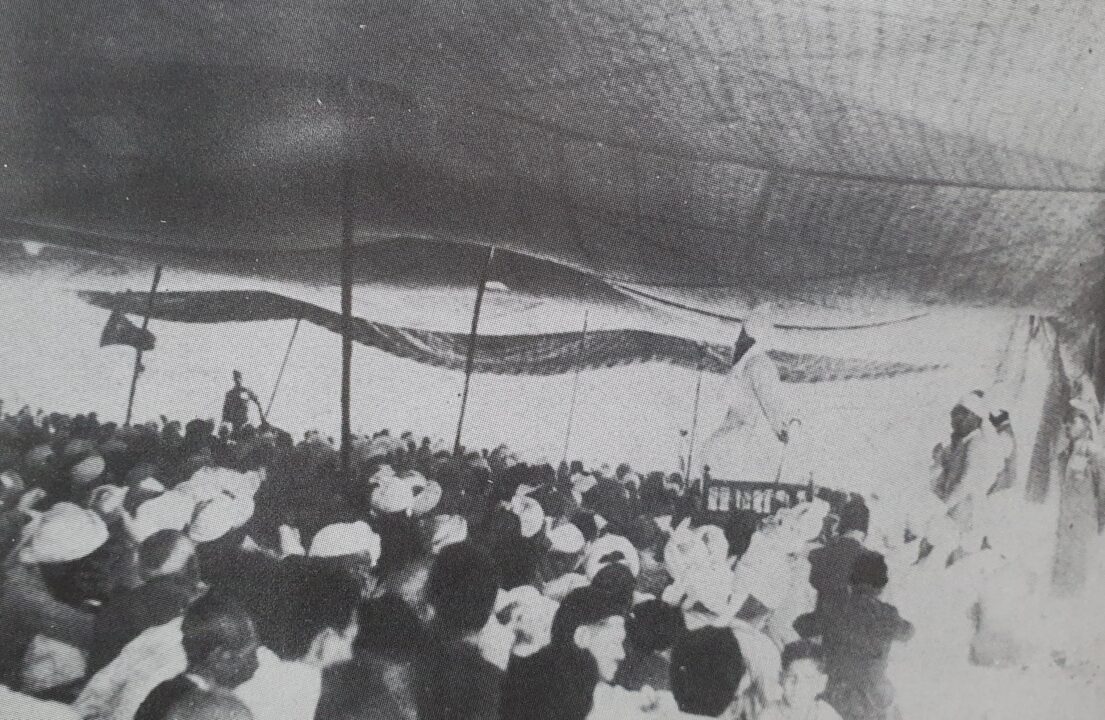Ata-ul-Haye Nasir, Al Hakam

During his Friday Sermon on 9 September 1927, delivered from Shimla, Hazrat Musleh-e-Maud, Mirza Bashir-ud-Din Mahmud Ahmadra shed light on the fact that the secret to one’s progress lies not merely in the realm of worldly pursuits, but in the realm of spiritual advancement.
Huzoorra said:
“A disease cannot be completely cured until it is treated in an appropriate manner, and the same is the principle for curing individual and national ailments. The alleviation of suffering and problems faced by contemporary Muslims is impossible without an appropriate remedy. And that appropriate remedy, which can heal their miseries of various kinds, cannot be attained without the guidance of God Almighty. These national ailments cannot be healed until they act upon the cure and method taught by God Almighty.
“Often, people are mistaken when they fail to differentiate between national and religious progress. As a result, they neglect the correct principle and, consequently, experience failure. The principles for national and religious progress are markedly distinct. Islam does not belong to a single nation; rather, it is a religion that comprises various nations. If only the national principles are kept in mind, a Muslim can never progress, since different nations have their own respective principles for their progress. For the progress of a nation, it is essential to ponder over its circumstances, requirements, traditions, habits and environment. If these factors are ignored, the nation regresses instead of [making] progress. However, once these factors are pondered over, a correct pathway is paved, which leads them to progress.” (Khutbat-e-Mahmud, Vol. 11, p. 200)
Huzoorra continued:
“As I have said earlier, Islam is a religion, not a ‘nation’, in fact, it brings various nations into its fold. Islam consists of people belonging to various nationalities, such as Kashmiris, Afghans, Arabs, Egyptians, Turks, and Chinese, and people belonging to many other countries. So, the Muslims of every nationality and country have different circumstances, requirements, habits and environments; for this reason, [the Muslims of] every nation would have different means of their progress. […] For this reason, it is imperative for religious progress to be based on religious principles. It is quite possible for the people of Bengal, Madras, Sindh, Turkey, or Arabia to progress in light of their respective circumstances, traditions and environments; however, if all nations aspire to progress on one common principle, it has only one way, which is for them to progress on religious principles. They can all progress once they firmly act upon the religious principles, since the religion has created within them a kind of harmony. While a certain nation can surely progress on its national principles, the Muslims as a whole cannot [progress using the principles of a certain nation]. Though it is a separate matter that they may also have some common factors for progress. Due to the fact that we desire the progress of the Muslims as a whole, we are required to act upon the principle that is set for religious progress.” (Khutbat-e-Mahmud, Vol. 11, pp. 200-201)
Huzoorra continued by saying that faith and certainty are the two factors required for religious progress, and ultimately for the progress of all mankind:
“For the progress of nations, their respective reservations and weaknesses need to be eliminated, whereas religious progress requires advancement in faith and certainty. This is such a power that could change anything. Always remember that faith is, in fact, ikseer-e-a‘zam [the greatest remedy]. This is the real remedy. People often seek imaginary solutions that might change their condition and prove beneficial for all problems; however, I inform you and call towards a remedy that is certain [in its effectiveness]. This remedy is the ikseer-e-imaan [remedy of faith]. […] The remedy of faith heals all those shortcomings that cause a nation’s humiliation and decline; in fact, it has such an impact that it revives those nations. The certainty and faith about reuniting with such a High Being – Who is unmatchable in His powers, encompasses all attributes, and fulfils all of our needs – inculcates such sincere love, which creates a true yearning. As a result, it grants one the passion to mould their character in accordance with His attributes. When faith reaches such a level and one’s willpower begins to flourish, it generates such strength that alone alleviates all shortcomings: one’s miserliness transforms into generosity, cowardice into bravery, harshness into tenderness, oppression into justice, and cruelty into sympathy and mutual assistance. In short, all of the vices are alleviated, and good morals are instilled. In this way, all of the nations can progress at the same time.
“Therefore, religious progress is that principle which is essential for the progress of Muslims. They will continue to move towards progress, in proportion to the advancement of their faith and certainty. This is the remedy through which the Muslims of the whole world would progress, regardless of their nationality. This remedy is for everyone, whether they are Kashmiri, Afghan, Turk, Arab, Egyptian, Chinese, Indian, or any other. Faith is the only remedy that can bring about a revolution, and faith grants such a power which is unmatchable.
“There is a kind of awakening among the [contemporary] Muslims, and they are concerned about their national progress. Though they are making national progress, they are regressing with respect to their religion. Turks are progressing; however, they are moving backwards with regard to religion, and this factor is causing them to part ways with the [Muslims of] India and Egypt. In the same way, Egyptians and Iranians are progressing in their respective spheres; however, they are facing differences in terms of [their interpretation of] Islam.
“The reality is that until they progress with respect to Islam and strengthen their faith and certainty, their [national] progress will move them away [from Islam]. Therefore, the methods of national and religious progress are different from each other. For Islamic progress, faith is essential and also that our actions are based on [the teachings of] Islam. If we do not follow this pathway, the Muslims will never progress. It is possible that Iranians, Turks and Egyptians may progress; however, it would not be the progress of Islam until there is religious progress, which is the practical essence of the religion of Islam. […] Islam is such a power that grants all kinds of advancements simultaneously [i.e., spiritual and worldly].
“Therefore, the secret to the progress of Muslims lies in their progress with respect to [adherence to the teachings of] Islam – that pure Islam which was brought by Allah’s Messengersa, the Islam which is presented by the Holy Quran, and the Islam which is pure from all those traditions which were mixed up by the Jews and Christians while converting to Islam.” (Ibid., pp. 201-203)
Then, while advising the members of the Jamaat, Huzoorra said:
“I call the attention of the members of our Jamaat to the fact that they have joined a Jamaat that has taken responsibility for not only the revival and progress of Islam but also for its propagation. They should bring people’s attention and remind Muslims that their progress is achievable only when they instil within them the spirit of progress with respect to Islam. Merely using the name of Islam would not lead to success, and it would be harmful if one mixes up national and religious progress.
“Always remember that there is only one way for the Muslims to progress and that it should be based on [the teachings of] Islam. Therefore, if one carries out tabligh while keeping in mind this point, it shall make their words impactful, and instil spirituality within their discourse and purity in their hearts.
“I pray to God Almighty that we may not halt our religious progress in pursuit of national progress, but rather, our national progress should be based on the progress of Islam. Amin.” (Ibid., p. 203)

During his Friday Sermon on 13 July 1928, Huzoorra said:
“Surah al-Fatihah encompasses such meanings that if one ponders over them, they can learn extraordinary points. At this time, the subject on which I wish to shed light from Surah al-Fatihah has been mentioned in the following words:
اِيَّاکَ نَعۡبُدُ وَاِيَّاکَ نَسۡتَعِيۡنُ
“[‘Thee alone do we worship and Thee alone do we implore for help.’ Surah al-Fatihah, Ch. 1: V. 5)]
“Nowadays, a question is arising among the Muslims as to ‘how we can progress and save ourselves from humiliation and regress.’ For this, various schemes are being utilised. In my view, the pathway to progress has been taught in اِيَّاکَ نَعۡبُدُ وَاِيَّاکَ نَسۡتَعِيۡنُ, which is normally meant as ‘Thee alone do we worship,’ and the meaning of this is taken to be offering prayers, fasting, performing Hajj, paying zakat, and in return, they expect to progress in the world. […] In order to become the عبد [servant] of God Almighty, it is not enough to merely perform prayers, fasts, Hajj or pay zakat. […] True servitude is for one to instil the attributes of God Almighty in their actions. […] Here, God Almighty has taught the Muslims to inculcate the attributes of God in themselves; it is then that they can truly deserve to claim, ‘Thee alone do we worship’.
“Now, look how greatly this question gets solved. People often say: ‘Muslims offer prayers; then why do they continue to regress and why don’t they progress?’ The reason is that they do not inculcate the attributes of Allah the Almighty within themselves. There was a time when the Muslims had advanced in all fields and no one could compete with them, and thus, they continued to progress since they did not advance in all fields to fulfil their desire to seek the world. Those who always aim for worldly gains, regress very quickly. Thus, there was a time when the Muslims were partaking in all fields, and their purpose was only to enhance the honour of Islam. […]
“The only pathway for the Muslims to progress is to become devoted servants of God Almighty, and to become beneficial for the world in all fields and aspects. […] It is essential for a community’s progress that each of its members brings perfection in various fields. […] We are required to keep in mind the purpose for which God Almighty has sent us into the world. A servant is obliged to endeavour to do their best, and if they do not do so, they cannot be deserving of reward. […] It is essential for us to set a high objective for our lives, and that is for us to become the true servants of Allah the Almighty, meaning that just like the attributes of God Almighty are manifested for everyone, we are also obliged to do the same and serve for the whole world’s betterment, and prove to be beneficial for all people. May Allah the Almighty enable us to inculcate His attributes within ourselves and then utilise them for the world’s benefit.” (Khutbat-e-Mahmud, Vol., 11, pp. 412-416)

